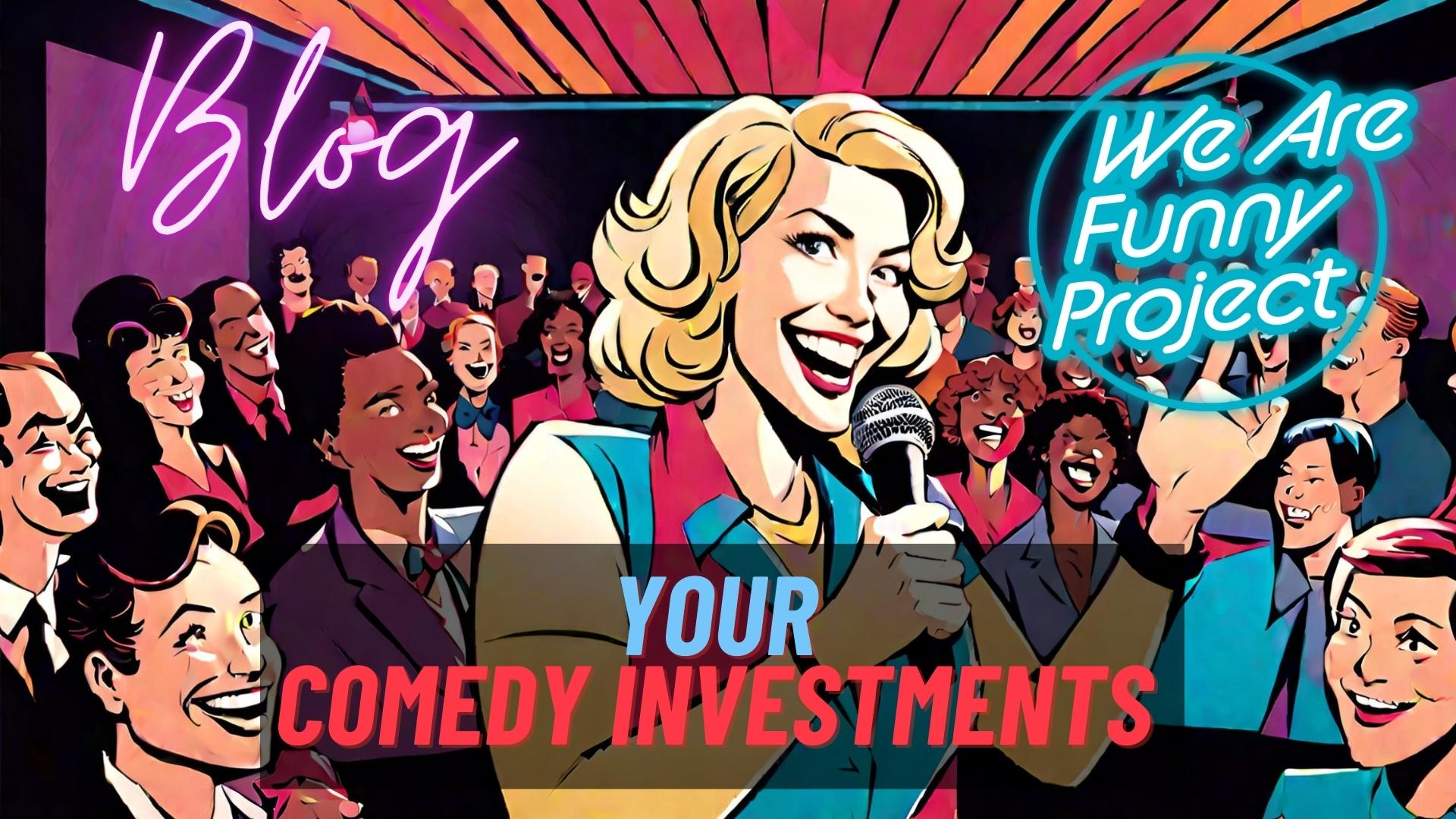Your Comedy Investments...

People get into stand-up for many reasons though the common denominator among uncommon people is almost always a standing adoration of live comedy. Open mic is the step from fandom into becoming…
The remarkable range of folk performing in open mike is a testament to the broad appeal of the art and the open church that is our scene.
It should be borne in mind that I run gigs in London, England, and this is an incredibly diverse and eclectic world City. This week I staged two shows with 26 people taking part. A quick review tells me among the performers there were:
Eight Nationalities Represented
Gay, Straight and Non-Binary people
Black, Brown, White and Asian folk
I can’t know for sure but I reckon the age range ran from very early '20s through to late '50s
What an incredible blend of different people coming together under one roof, sharing the same love of the game/art. Some are rabidly fame and wealth hungry, laser-focused upon success. For most it is an occasional past-time and they enjoy being around like-minded funny folk.
Naturally, some hobbyists are more dedicated than others, although it strikes me that every act that performed in these two entirely typical gigs must be doing at least one spot per week while those with “the bug” are hitting four or more weekly nights… the kind of dedication that will see significant improvements happen quickly.
Stand-up is a unique “hobby” in many ways. It’s not a sport that’s going to help keep you fit (quite the contrary given constant proximity to the bar) and while there is a social aspect for sure, at the end of the day it’s a “lone wolf” experience counter to any notion of being part of “a team”.
Other common hobbies have every likelihood of leading to clear and probable career opportunities, such as carpentry or cooking.
Stand-up surely does not provide the relaxing aspect that past-times such as fishing or gardening might offer.
Everything is laid on for the open mic comedian. The act simply has to arrive at the venue to find the stage, the lights, the mike and stand all in place and are good to go. There is no need for rods and reels, hoes and spades, spiked shoes and team kit, tools and timber, pots and pans… maybe there’s a notebook and pen (or digital equivalent) in the mix. At first glance, stand-up comedy is an inexpensive vocation… at first glance, anyway.
I would posit that there are ultimately two currencies in the world. Time and money. Each finite and highly valued.
Allow me to paint a picture of what a committed open-miker does beyond the time spent working up a premise, writing, editing, rehearsing, editing, writing and booking a gig… that’s a lot of time and energy already committed. Allow us to presume our imagined act is gigging three nights per week, serious commitment, but not swinging for the stars level effort either.
That’s three full evenings a week passed over to this crazy craft of ours. With travel time, plus a couple of hours to attend the show, maybe an hour socializing after, that’s likely in the region of 4 -5 hours a night, 12 - 15 hours per week!
What are the opportunity costs of this pursuit? Each gig represents not doing something else; spending time with friends and family, earning money, following other interests, just flopping out in front of Netflix…
Now the money. Once again, I speak as a London-based promoter, but I reckon the average spend for a gig is in the £15 - £20 (USD$ 20 - $27) range, covering travel and a couple of drinks. Multiply that by 3 gigs per week and the act is looking at £45 to £60 (USD $60 - $81) per week. Consider that over the course of a year and that figure is quite possibly the equivalent of a good gym membership AND dues to some kind of club (hiking or rugby or whatever) AND essential kit such as running shoes or power tools AND some kind of direct education in the form of a teacher or trainer.
That’s a lot of time, money and opportunity cost. Remarkable effort. Full respect to open-mic acts!
Yes, the rewards of success for the very most successful stand-ups in the world are huge. Below the A-list there is a limited, yet exciting range of opportunities, from being a travelling club comic, show writer, broadcaster, actor… the pyramid truly does thin towards the peak.
So, why do the acts do it? I’ve addressed opening the door to crazy fame and wealth for the extremely select few so, in the main, it has to be something else. You may think my conclusion is self-evident and you’d be right. It’s the love of getting laughs. What a feeling. Every act knows it, loves it, chases it…
Conversely, getting up and trying to make a room of strangers laugh is fraught with danger. Dying on stage feels terrible. While almost always a valuable lesson it is also humiliating, confounding and esteem-shattering. Minute-after-minute of stone cold silence, awkward coughs, occasional hostile whispers and even more occasional loud heckles.
What a feeling. Every act knows it, hates it, strives to avoid it…
So, I fail to understand why, after all of the recognized effort, sacrifices of time and money, so few acts do not redirect some of that time and treasure to doing all they can to get as good as they can, as fast as they can.
It seems to me that acts can often get distracted by the concept of constant gigging. I understand why. It’s fun. It’s real. It’s social. It’s solid experience.
Absolutely, precious stage-time, performance hours, is key.
Now, what else?
For any art form, for any skill set, there are known rookie errors to be avoided. Equally, there are tips, tricks and techniques for getting the best results.
In practically every other hobby or pursuit, people will seek out advice from more expert and experienced people in tandem with actually doing whatever it is that they do.
Sporty types will routinely have personal trainers and coaches in order to improve. Craft-oriented people such as painters and sculptors will frequently take classes and seek qualified feedback and advice.
Those who lean towards practical passions such as cooking or carpentry will often take on some kind of apprenticeship, however casual, so as to get better and stop wasting ingredients and timber.
Advice from a quality comedy teacher can turbo-charge advancement, open new avenues such as MCing/hosting, bolster the laugh rate and raise the quality of the laughter. Successes that have the added advantage of reducing the frequency of those terrible tough gigs.
I believe the equation for comedians to get better, funnier, faster, stronger is… a blend.
Stage-time
Record and review and amend the set
Get expert advice, tips and techniques and incorporate appropriately
Stage-time
Record and review and amend the set with special attention to the incorporation of the aforementioned advice
Stage-time
Stage-time
Record and review and amend the set with special attention to the advice from personalized sessions
Gig like hell and pull over for the occasional “tune-up” with an expert
Working with a coach will help an act learn of the leaks in their game that they are blind to simply because they are too close to the material. A director will offer ideas to build on what is working, or detail why a joke is not working and how to fix it, or why a bit may have to be let go… at the end of the day the advice can be taken on board or dismissed.
Diversifying some of that time and treasure, investing beyond simply gigging is a wise call. Performing one less night a week for a month or two, and spending on some expert help will almost certainly deliver swift benefits. Rewards that will remain with the act and their future work forever.
My point on diversifying and re-investing does not end here.
The We Are Funny Project has a progression process and policy. Everyone starts with a five. Each show has at least one ten spot. This serves as either a challenge for a five to try and move up, or, effectively as an audition for an act to get a twenty headline spot some time soon afterwards.
A mere twenty shows back after the lockdowns, I have offered four acts the jump to headliner for early next year and three of those did not yet have a decent headshot for the publicity. Some weeks later, this still appears to be the case…
If an open-miker is moving towards the paid circuit then having quality head shots is a simple necessity. Without them, there is a needless stalling in getting their face out there, alongside their name, just at the time things could really start moving.
Here in London, the man to see is also the fella who took pretty much all of the pictures seen in these blogs. A comedian in his own right and the de facto documentarian of UK comedy, Steve Best.
Steve has photographed the good, the bad and the really truly ugly of the British comedy scene. He has 2 books of comedian portraits published, currently has a photographic exhibition running in London and regularly takes great publicity pics of the mega-famous and the savviest up’n’comers.
There is only one Steve Best but there are quality photographers around the planet that for something like a couple of hundred quid/dollars will deliver those crucial publicity pics that often tell more than a thousand words.
Acts. You have already invested so much in yourself and your passion. Just a little tweaking of that time and money and you can get more of what you really came for… fresh circuit prestige, laughs and opportunities.
Naturally, all of the photos featured within this blog are by Steve Best at www.stevebest.com
Online classes for comedians at every level of experience
Learn and practise with the most talented comedians
Free open mic comedy, with top quality headline comedians
For stand-up comedians
For creative agency teams
Stand-up skill set. Stand-out results
Small print
Contact
We Are Funny Project Limited, 61 Bridge Street, Kington, HR5 3DJ, is registered in England and Wales, company number 08537398.
Copyright © We Are Funny Project Limited. All rights reserved.

